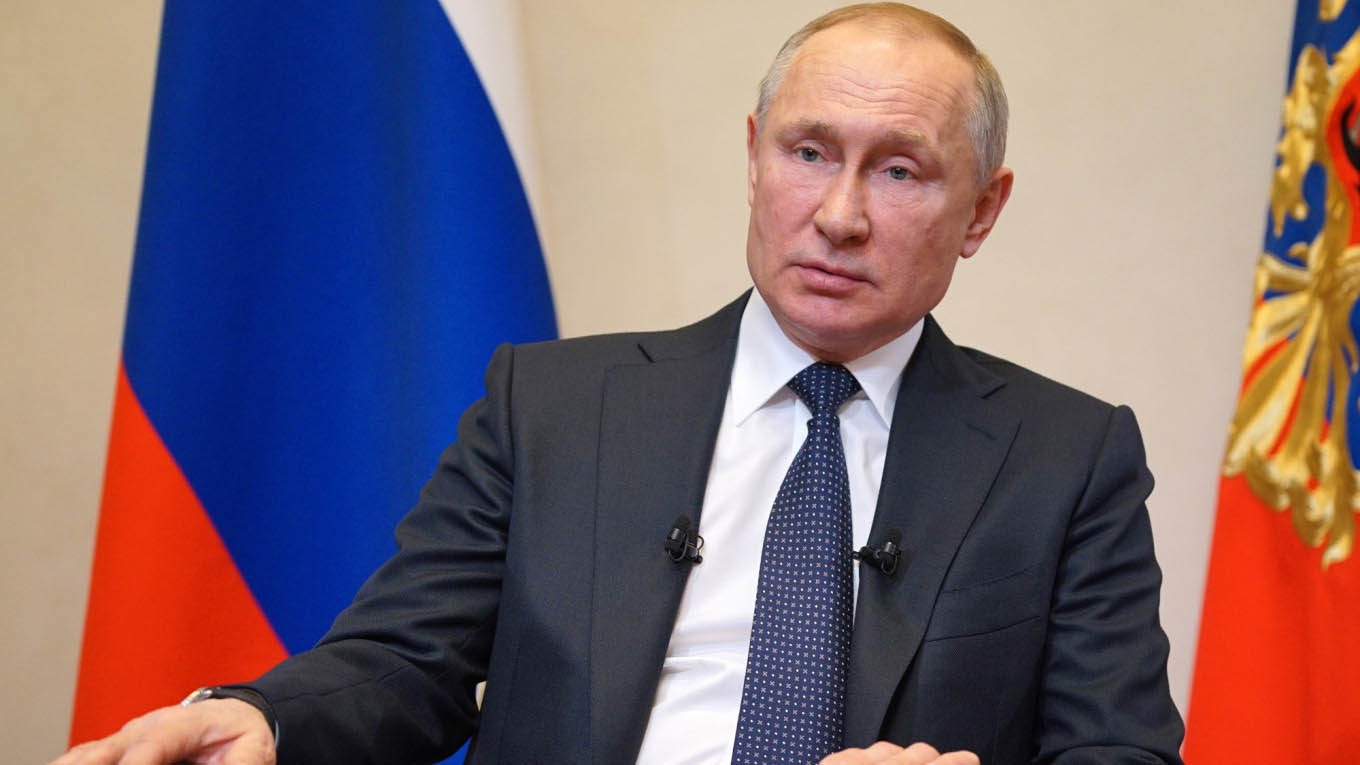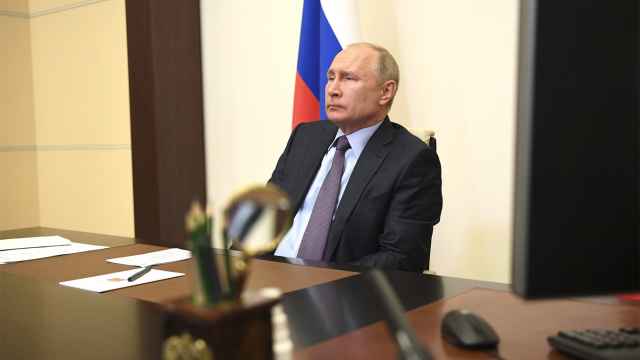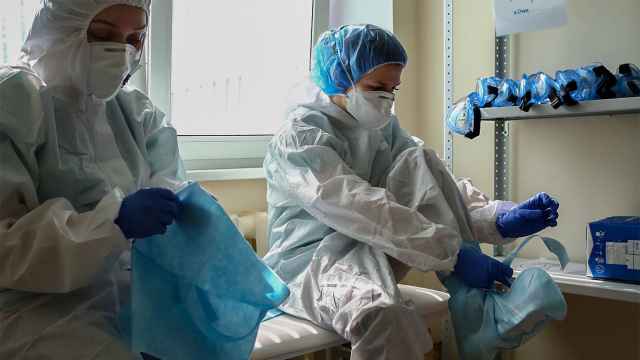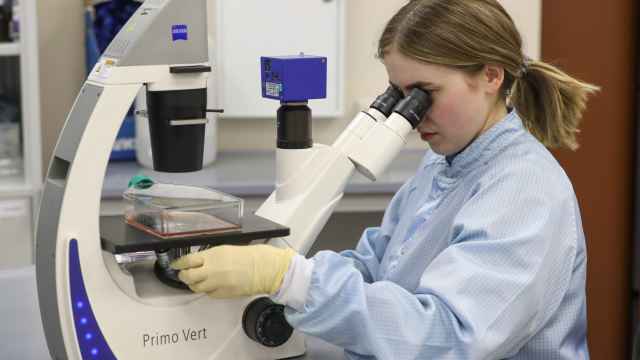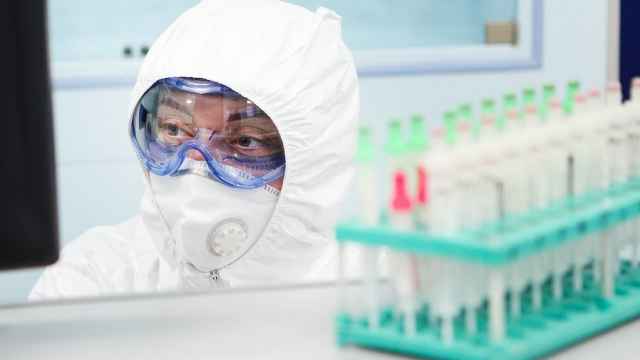Casually reclining in front of an office desk, President Vladimir Putin addressed the nation on the coronavirus pandemic for the first time on Wednesday afternoon — a month after Russia announced its first case.
The Russian leader kicked off the speech by postponing a planned April 22 vote on constitutional changes that could see him remain in the Kremlin until 2036. He did not announce a new date for the vote.
Then he declared a week-long paid national holiday from March 28 — the purpose of which, he said, was to encourage people to remain at home in an effort to limit the spread of the deadly coronavirus.
“Don't think: ‘This can't happen to me.’ It can happen to anyone,” Putin said. “The most important thing is to stay home.”
But Putin, to the shock of many observers, did not enforce additional measures that would ensure that Russians remain at home — a step that epidemiologists argue is essential for limiting person-to-person transmission of the highly contagious virus.
“People need to be separated at the very least — and I will underscore that this is at the very least — for two weeks,” Vasily Vlasov, an epidemiologist at the Higher School of Economics, told The Moscow Times. “And to ensure that this happens, measures need to be put in place that will actually keep them at home.”
As the coronavirus pandemic has spread across the globe, devastating nations from Iran to Italy to the United States, Russia has so far remained largely untouched, according to official statistics. The country has so far only reported 648 official cases of the virus and only three deaths. Last week, Putin said that the situation is “under control.”
But in recent days, the official narrative around the danger of the virus to Russia has begun to change.
On Tuesday, Moscow Mayor Sergei Sobyanin, who is heading Putin’s coronavirus taskforce, told the president that the official figures were likely underestimating the spread of the disease and warned that the country faces a “serious situation.” To underline Sobyanin’s point, the number of new cases tripled overnight.
Beyond the shifting rhetoric, Russian authorities have also in recent days instituted a host of measures aimed at slowing the spread of the disease.
They have closed all sporting and cultural events, businesses like nightclubs and cinemas and most large gatherings. From Thursday, Moscow residents aged 65 and older will be ordered to self-isolate at home.
In his speech Wednesday, Putin said that only key businesses like banks, pharmacies and supermarkets would be allowed to stay open during the week-long holiday.
But the measures have come piecemeal and are still lagging behind most of the world, said Vlasov.
He pointed to a move by Indian Prime Minister Narenda Modi on Tuesday to lock India down for three weeks, and Israel's policy of not allowing its citizens to go beyond 100 meters from their homes unless they are visiting an essential shop like a pharmacy or a supermarket.
“The Russian authorities are heading in the right direction,” Vlasov said. “But unfortunately it’s all being rolled out very poorly and so the measures will most likely be ineffective.”
Populist measures
Putin spent the rest of his speech Tuesday unveiling a package of measures to support the Russian economy and businesses suffering from the double blow of the coronavirus and sinking oil prices after Russia pulled out of a deal with Saudi Arabia limiting energy production earlier this month.
He announced that families eligible for maternity capital will receive an extra 5,000 rubles ($44.80) per month from the government for each child under 3 years old. Small and midsized businesses will receive a six-month tax deferral. And those who lose their jobs or take sick leave will receive payments at minimum wage until the end of the year.
But despite grim economic warnings — the Kremlin’s own modelling suggests the Russian economy could shrink by as much as 10% this year in a worst-case scenario — Putin held back from adopting more radical measures to support the economy.
“The measures are really quite muted,” said Sofya Donets of Renaissance Capital. “It’s not a large amount of additional money, and the measures aren’t widespread — they are very concentrated on socially sensitive clusters, like pensioners and families with children.”
Other tinkering measures included making banks offer repayment vacations on consumer loans and mortgages if a borrower’s income drops significantly, while small businesses will get a six-month deferral on some of their tax bills and no-penalty extensions to their loans.
The Russian president also said that all interest and dividend payments leaving Russia will incur a 15% tax — up from the current 2%.
Tatiana Stanovaya, founder of the political analysis project R.Politik, said that the form and substance of Putin’s address stayed true to his history as a populist leader.
“In Russia, the authorities have always been scared to look weak and to instill panic in society,” she said. “They are trying to inspire confidence in the people and to make it look like the situation is under control.”
But as Vlasov noted, the spread of the disease in Russia may only be in its early stages.
“Either the pandemic is just starting here or it's moving through the population in a mild form,” he said. “The second version is less likely. Which means that we have to prepare for an outbreak.”
A Message from The Moscow Times:
Dear readers,
We are facing unprecedented challenges. Russia's Prosecutor General's Office has designated The Moscow Times as an "undesirable" organization, criminalizing our work and putting our staff at risk of prosecution. This follows our earlier unjust labeling as a "foreign agent."
These actions are direct attempts to silence independent journalism in Russia. The authorities claim our work "discredits the decisions of the Russian leadership." We see things differently: we strive to provide accurate, unbiased reporting on Russia.
We, the journalists of The Moscow Times, refuse to be silenced. But to continue our work, we need your help.
Your support, no matter how small, makes a world of difference. If you can, please support us monthly starting from just $2. It's quick to set up, and every contribution makes a significant impact.
By supporting The Moscow Times, you're defending open, independent journalism in the face of repression. Thank you for standing with us.
Remind me later.




